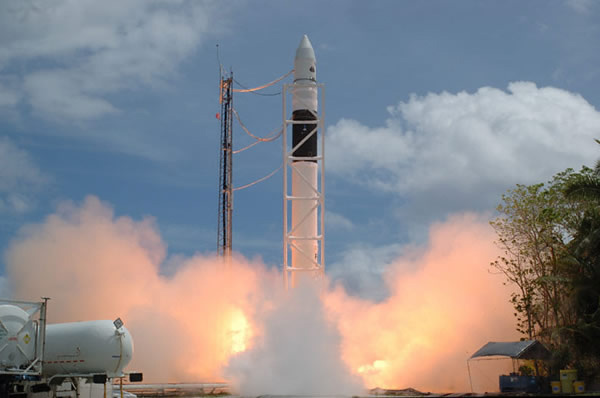SpaceX Pushes Falcon 1 Rocket Debut to Friday

Breaking space news, the latest updates on rocket launches, skywatching events and more!
You are now subscribed
Your newsletter sign-up was successful
Want to add more newsletters?

Delivered daily
Daily Newsletter
Breaking space news, the latest updates on rocket launches, skywatching events and more!

Once a month
Watch This Space
Sign up to our monthly entertainment newsletter to keep up with all our coverage of the latest sci-fi and space movies, tv shows, games and books.

Once a week
Night Sky This Week
Discover this week's must-see night sky events, moon phases, and stunning astrophotos. Sign up for our skywatching newsletter and explore the universe with us!

Twice a month
Strange New Words
Space.com's Sci-Fi Reader's Club. Read a sci-fi short story every month and join a virtual community of fellow science fiction fans!
This story was updated at 9:58 a.m.EST.
After threefailed attempts, the private launch firm Space Exploration Technologies (SpaceX) is once more set to debut its Falcon 1 rocket in a Fridayspace shot.
SpaceXofficials delayed the launch 24 hours to allow additional time to system checksand reviews.
"We arefeeling more and more confident with each countdown attempt," said Elon Musk, founder of the El Segundo, California-based SpaceX, via e-mail from the firm's launch site. "It is alsoworth noting that four countdown attempts is actually a small number for abrand new rocket from a brand new launch site.
Thetwo-stage Falcon 1 rocket is slated to launch spaceward at 4:00 p.m. EST (2100 GMT)from its equatorialstaging ground on the Kwajalein Atoll in thePacific Ocean's Marshall Islands. The launch window closes at 10:00 p.m. EST(0300 March 24 GMT), SpaceX officials said.
A series ofengine tests over the last week have raised no serious issues, though SpaceX engineers are trying to cover all their bases.
"Somepeople out here think that everything should work the first time, which is notrealistic," Musk said.
Breaking space news, the latest updates on rocket launches, skywatching events and more!
SpaceX'sfirst Falcon 1 rocket is slated to orbit the $800,000 FalconSat-2spacecraft, a cube-shaped probe built by U.S. Air Force Academy cadets tostudy the effects of space plasma on communications and global positioningsatellites. The small spacecraft weighs about 43-pounds (19.5-kilograms) andmeasures 12.5 inches (32 centimeters) per side. The U.S. Air Force and DefenseAdvanced Research Projects Agency (DARPA) are supporting the $6.7 millionlaunch.
FalconSat-2'smission has suffered three false starts due to technical issues. A computerglitch and liquid oxygen leak forced SpaceX launchcontrollers to abortan attempted space shot on Nov. 26, while a structural issue prompted a Dec.19 scrub. Unsatisfactory vehicle tests led to the thirdscrub.
But each ofthose attempts also yielded valuable experience for SpaceXlaunch crews and flight controllers, Musk said.
"Even ifthe launch is not completely successful, we will be able to gather a lot ofgood data," he added.
Falcon 1 isthe first of a planned family of rockets which SpaceXhopes will ferry ever-larger payloads into orbit. The firm is also developing aheavy-lift Falcon 9 rocket and its Dragonreusable crew and cargo capsule for servicing flights to the InternationalSpace Station (ISS).
The firststage of Falcon 1 is designed to parachute to an ocean landing where it can beretrieved by recovery crews for later refurbishment and a future launch. Theliquid oxygen and kerosene-powered rocket stands about 68 feet (21 meters) talland is capable of delivering about 77,000 pounds ofthrust, SpaceX officials said.
In additionto its Kwajalein Atoll launch site, the rocket isalso designed to launch from California's Vandenberg Air Force Base, where Muskexpects Falcon 1's second mission to begin.

Tariq is the award-winning Editor-in-Chief of Space.com and joined the team in 2001. He covers human spaceflight, as well as skywatching and entertainment. He became Space.com's Editor-in-Chief in 2019. Before joining Space.com, Tariq was a staff reporter for The Los Angeles Times covering education and city beats in La Habra, Fullerton and Huntington Beach. He's a recipient of the 2022 Harry Kolcum Award for excellence in space reporting and the 2025 Space Pioneer Award from the National Space Society. He is an Eagle Scout and Space Camp alum with journalism degrees from the USC and NYU. You can find Tariq at Space.com and as the co-host to the This Week In Space podcast on the TWiT network. To see his latest project, you can follow Tariq on Twitter @tariqjmalik.
